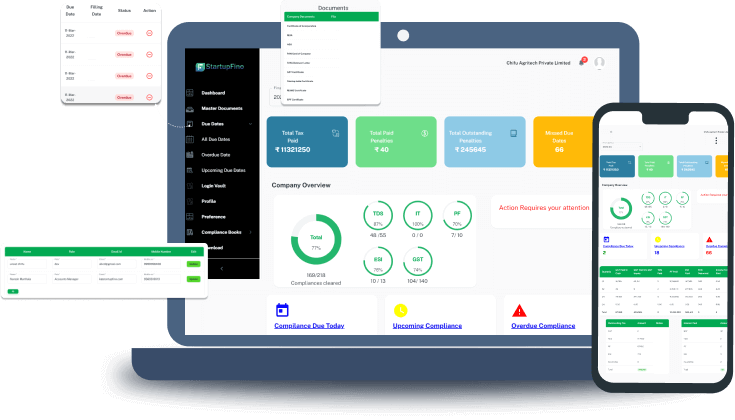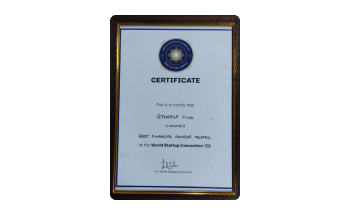Registering for Goods and Services Tax is required for businesses in India whose annual turnover exceeds a specified threshold. The threshold limit depends on the type of business and can be Rs.40 lakh, Rs.20 lakh or Rs.10 lakh. Businesses that cross this turnover limit must register and comply with GST regulations.
Registration under the GST system is mandatory for certain business types, regardless of turnover. Conducting business without proper registration under GST can lead to penalties and fines. The registration process enables tax authorities to monitor a company's transactions for tax purposes.
Completing startup GST registration takes 2 to 6 working days through the official portal. However, specialised consultants claim they can accelerate this process to obtain a registration number in simple steps. Registering for GST ensures compliance with tax laws and allows businesses to operate legally.
Key Components of GST Registration
Given below are the main components of gst registration for startups:
|
Component
|
Description
|
|
Central Goods and Services Tax
|
Levied by the Central Government on transactions within a state. Applicable to transactions occurring within one state.
|
|
State Goods and Services Tax
|
Charged by the State Government on transactions within its jurisdiction. Limited to transactions within a specific state.
|
|
Integrated Goods and Services Tax
|
Imposed by the Central Government on inter-state transactions or between a state and a Union Territory. Relevant for transactions crossing state or Union Territory boundaries.
|
Benefits of Registration under GST
Following are the merits of opting for online registration under GST in India:
For regular registered businesses:
- Avail input tax credits on purchases
- Carry out inter-state trade without restrictions
For Composition Scheme taxpayers:
- Lower compliance burden
- Reduced tax liability
- Lesser impact on working capital
For voluntary GST registration (Turnover below Rs.40 lakhs):
- Claim input tax credit
- Conduct inter-state business seamlessly
- Smooth listing on online & e-commerce platforms
- Gain competitive edge over unregistered businesses
Getting a registration number, even when below the turnover threshold, allows businesses to take advantage of input credits, inter-state trade and improved credibility. Composition Scheme offers the benefits of lesser compliance burden and lower taxes.
Eligibility for GST Registration
The following businesses and individuals are considered fit for gst registration eligibility:
- Companies: Enterprises with turnover over Rs 40 lakhs annually (for special states, the limit is Rs 20 lakhs)
- Service Providers: Those with turnover exceeding Rs 20 lakhs per annum (Rs 10 lakhs for special states)
- Exemptions: Entities dealing only in GST exempt goods/services need not register regardless of turnover.
- Pre-Registered Entities: Businesses registered under old tax regimes like Excise, VAT etc. must migrate to GST.
- Inter-State Suppliers: Anyone supplying goods across different states.
- Casual Suppliers: Entities that undertake occasional taxable supply.
- Reverse Charge Payers: Businesses which pay tax under reverse charge mechanism.
- Agents & Distributors: Input service distributors and agents.
- E-Commerce Operators: Platform owners or aggregators.
- Non-Resident Suppliers: Non-resident individuals/businesses doing taxable supply in India.
- Representative Agents: Agents supplying on behalf of a principal supplier.
- E-Commerce Sellers: Sellers offering goods/services via e-commerce sites.
- Foreign Online Service Providers: Overseas suppliers of online information, database access etc. to customers in India, if unregistered already.
GST Turnover Limits
Any person or entity can voluntarily register for GST regardless of turnover. However, registration becomes mandatory upon crossing a defined annual turnover threshold.
Service Providers: Suppliers with over Rs 20 lakhs aggregate turnover must register, except for special states where the limit is Rs 10 lakhs.
Goods Suppliers: Those with turnover above Rs 40 lakhs must register, provided -
- They supply only goods, no services
- Do not make intra-state sales in Arunachal Pradesh, Manipur, Meghalaya etc (special states)
- Do not supply ice cream, pan masala, tobacco etc.
For others: registration limit is Rs 20 lakhs (Rs 10 lakhs for special states)
Special Category States: Arunachal Pradesh, Assam, Jammu & Kashmir etc. enjoy lower turnover limits.
Aggregate Turnover comprises:
(Taxable Supplies + Exempt Supplies + Exports + Inter-state Supplies) - (Taxes + Value of Inward Supplies + Value of Supplies under Reverse Charge + Value of Non-taxable Supplies)
It is calculated PAN-wise. So turnover of all businesses with same PAN must be summed, irrespective of location.
Crossing the defined turnover thresholds makes registration under GST mandatory to legitimately conduct business. Voluntary registration is also allowed for improved compliance.
|
Type of Entity
|
Turnover Limit for Registration
|
|
Voluntary Registration
|
No turnover limit
|
|
Mandatory Registration for Service Providers
|
Rs. 20 lakhs (Rs. 10 lakhs in special category states)
|
|
Mandatory Registration for Goods Suppliers
|
Rs. 40 lakhs (Rs. 20 lakhs if not meeting specified conditions; Rs. 10 lakhs in special category states)
|
|
Special Category States
|
Arunachal Pradesh, Assam, Jammu and Kashmir, Manipur, Meghalaya, Mizoram, Nagaland, Sikkim, Tripura, Himachal Pradesh, Uttarakhand
|
Documents Required for GST Registration
For online registration under GST, the following documents are must:
|
Public/Private Limited Company Documents
|
|
PAN card
|
|
Company's Certificate of Incorporation
|
|
MoA and AoA of the company
|
|
Id. proof & address proof of directors and authorised signatory
|
|
Passport-sized photographs of directors & authorised signatory
|
|
Copy of Board resolution for appointing authorised signatory
|
|
Bank account opening information
|
|
Address proof of business location
|
|
Sole Proprietorship Business Documents
|
|
PAN card of owner
|
|
Aadhar card of owner
|
|
Photograph of owner
|
|
Bank account details
|
|
Address proof
|
|
Partnership Firm Documents
|
|
PAN card of all partners (including managing partner and authorised signatory)
|
|
Copy of partnership deed
|
|
Photograph of all partners and authorised signatories
|
|
Address proof of partners (Aadhar card, Passport, driving license, Voters identity card, etc.)
|
|
Aadhar card of authorised signatory
|
|
Proof of appointment of authorised signatory
|
|
Registration certificate / Board resolution of LLP (if applicable)
|
|
Bank account details
|
|
Address proof of principal place of business
|
|
HUF Documents
|
|
PAN Card of HUF and Passport size Photograph of Karta
|
|
ID & Address Proof of Karta
|
|
Address proof of place of business
|
|
Bank Account Details
|
Online GST Registration Process
Follow these steps for online registration under GST process:
Part A:
- Visit the Government's GST portal
- Under 'Services' tab, click on 'Registration' and select 'New Registration'
- Choose 'Taxpayer' from the drop-down menu
- Fill and submit Form GST REG-01 with your business details like legal name, state, email ID, phone number, PAN
- Verify the information entered by submitting the OTP received on email and phone
- You will get a Temporary Reference Number on completion of Part A
Part B:
- Login with TRN to start Part B registration
- Enter CAPTCHA code and complete OTP verification
- Provide essential business information - company name, PAN, state, date of commencement etc.
- Submit personal and professional details of up to 10 promoters/directors/partners
- Enter authorised signatory information
- Add principal place of business address and official contact details
- Submit additional places of business, goods/services details and bank account details
- Upload mandatory supporting documents as applicable
- Preview and digitally sign the application
- Click Submit to apply for registration
- You will receive the Application Reference Number on registered email/phone confirming application submission
Checking Registration Status Online
Follow these simple steps to check registration status online:
1) Visit GST portal - https://www.gst.gov.in/
2) Under 'Services' tab, select 'Registration'
3) Choose 'Track Application Status' option
4) Enter your Application Reference Number
5) Input captcha code and click 'Search'
6) Your application status gets displayed
Downloading GST Registration Certificate
Here is how to download the registration certificate from GST portal:
1) Login with your credentials
2) Go to 'User Services' under 'Services' tab
3) Click on 'View/Download Certificates' link
4) Select 'GST Registration Certificate'
5) Provide details - GSTIN or ARN
6) Hit the 'Download' button
7) Certificate gets downloaded as a PDF file
8) Save and print the certificate for future use
Validity of GST Registration Certificate
The validity of a registration certificate under GST varies depending on the type of taxpayer. For regular taxpayers, the certificate is considered valid until and unless voluntarily surrendered by the taxpayer or cancelled by the GST authority.
Online GST Registration Fees
The government does not charge any fees for obtaining a registration certificate under GST in India. The registration process is free of cost. However, businesses need to provide rightful information meeting all gst registration criteria to ensure registration.
Penalties for Not Registering Under GST
Businesses mandatory required to register under GST but fail to do so can face substantial penalties under GST Act. The penalty is the higher of: (a) 10% of due tax amount or (b) Rs 10,000.
For willful tax evasion, penalty equals 100% of taxes due. Also with this, interest is charged on unpaid tax liability. To avoid such consequences, it is vital for companies to comply with registration regulations applicable to them.
Why Choose StartupFino for GST Registration?
StartupFino specialises in providing you with GST registration for startups. We assist businesses right from the initial consultation stage to ensure you fulfil all mandatory requirements for online registration under GST. Our services involve:
- Advising on eligibility criteria and turnover thresholds
- Gathering KYC documents
- Preparing and submitting application forms
- Connecting with tax authorities
- Securing GSTIN post successful registration
We undertake all essential processes to get you a GST number, enabling you to operate legally and get all the benefits.































































